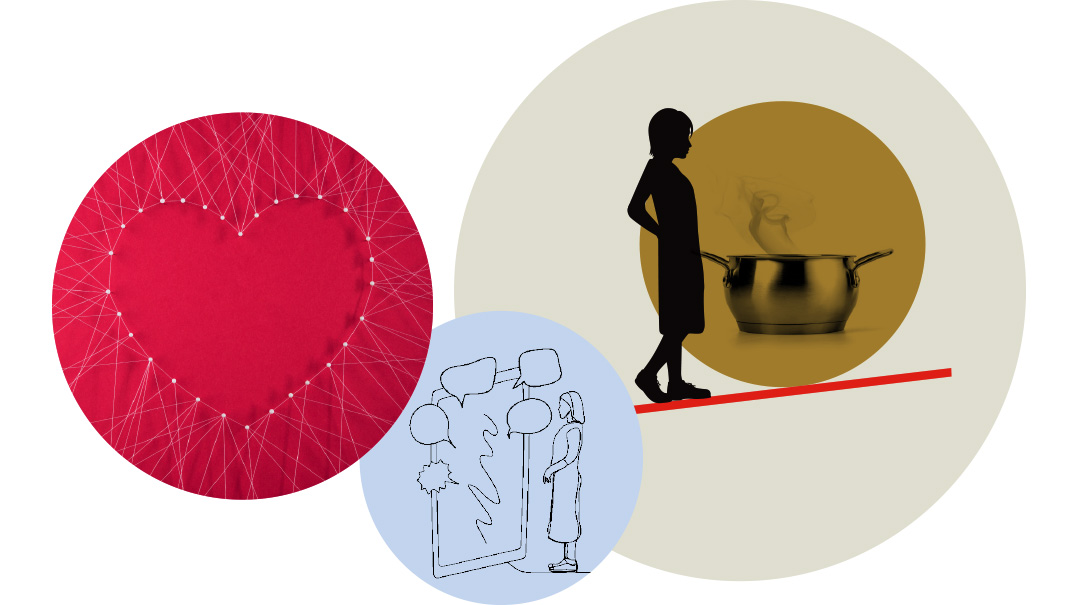Family First Inbox: Issue 830

“I still don’t daven every day, and I’m still waiting for yeshuos, but I’m learning that sometimes what Hashem asks from us isn’t as hard as we think”

Non-Family in a Family Business [All in the Family / Issue 829]
I read with interest your article about family members who work together, and I want to touch on one important point that was missed. It can be extremely difficult for unrelated people to work for family businesses. I work for a small accounting business run by a father and son. The son joined the business a few years ago, and since then the environment has become toxic.
There has been a lot of staff turnover because of the toxic environment, but the father is oblivious because he has blinders on when it comes to his son.
I know a lot of people who have this issue as well. How are you supposed to tell a parent that their child isn’t doing a good job or is creating a toxic environment? I’d love to see a follow-up article about the perspectives (good and bad) of people who work for family businesses.
Anonymous
It’s Not Just Fat-Shaming [The Conversation Continues / Issue 829]
I was saddened to read that so many women were fat-shamed by the people who are supposed to love them the most. Everyone knows about lashon hara, but I meet few people who know the meaning of ona’as devarim, which is the act of hurting people with words or gestures of criticism, contempt, or callous disrespect (Vayikra 25:17).
Let’s face it. People are very judgmental. From the time we’re born, we tend to feel safe with people who are most similar to us. It’s wired into the brain that “different is defective/dangerous.” This is an inborn survival tactic to keep outsiders distant.
By the time children reach first grade, they already think that only those who have certain possessions, looks, and talents are valued and significant, while the rest are inferior and defective.
It’s not just the widespread fat-shaming that hurts children so deeply. Research shows that aggressive children gain status by bullying other children, especially those who are emotionally sensitive or different in any way. That difference might be a slightly darker skin tone, a slightly larger nose, having parents who are baalei teshuvah, immigrants, or converts, or children who don’t have the latest sneakers, or need to be taken out of class for remedial tutoring.
The smallest defect or failure is used by bullies as an excuse to criticize, mock, exclude, and torment those who don’t meet the accepted standards or conform to the ideal snapshot of how a human being “should” be.
We will never eliminate the bullies or the self-appointed “elite,” but parents and teachers can speak more about the sin of ona’as devarim in homes and schools, and teach children the skills needed to maintain their sense of self-worth despite the inevitable scorn and shaming that most will experience.
Miriam Adahan
I’m the One You Hate [The Conversation Continues / Issue 829]
I’m the one you all hate. Yes, you read that correctly. I’m that girl who can eat whatever she wants and still be a size XS. You know what? Those who hate me kind of have a point. I’m sure it can be frustrating when you have to watch every single morsel that goes into your mouth, and I can do whatever I want, seemingly without repercussions.
While I do understand you, can you try to understand my side of things for a change? Do you know the fear of being too skinny? Did you ever lie in bed at night wondering if you’ll be able to have kids? Were you ever knocked out for a full week with a simple flu, watching yourself waste away and not being able to do anything about it? Do you know what it’s like to dread fast days? For a girl who has to eat every two hours, Yom Kippur is long. And hard. And lonely.
Do you know what it’s like when you’re in the middle of doing something and then everything has to stop because you need food and you need it now? No, baruch Hashem, I’m not diabetic. I’m your regular, mostly healthy Bais Yaakov girl with a weight problem.
Yes, my weight problem may be different from yours, but it’s still there. It’s not bad enough to warrant medical intervention, so I have to take care of it myself. There’s no such thing as not eating because I’m in a bad mood and have no patience. There’s no such thing as skipping a meal or a snack because I’m busy. Eating and calculating when my next meal will be are constantly on my mind, never letting me take a break.
Aside from dealing with all of this, I also have to deal with the comments, the stares, and the questions. Hello? Why is my body size the topic of your conversation? You would never talk about a bigger girl like that! Why was it okay when one of my high school teachers announced in front of the whole class that my summer homework is to gain five pounds? Would you tell a girl that she has to lose five pounds like that? (This is only one example. I can easily provide many more.)
I don’t mean to come and air my dirty laundry in public. I’m trying to make a point. Yes, I know it can’t be easy to be big in our society, but it’s not always so easy to be skinny.
Please keep your comments about other people’s waistlines to yourself. It’s totally, absolutely none of your business. Thank you, Miriam (Pascal) Cohen, for giving us a voice.
A girl with a (different kind of) weight problem
Frozen Connection [Care to Connect / Issue 828]
The section on tefillah was very interesting for me. I suppose it shouldn’t be surprising that many other women struggle with this.
I used to think that a person who has tzaros would have an easier time concentrating. Though it wasn’t easy, I managed to daven fairly regularly through my twenties and thirties.
Later on, things took a turn. Not the blessed chaos of too many kids to get out in the morning but a shocking, traumatic turn. And then shortly after, there was another such turn, and as time went on, even more.
People were always telling me to daven. “Just ask Hashem for help,” “You just have to keep davening,” “The only thing to do is daven.” As if I wasn’t trying.
I davened three times a day, every day. But instead of uplifting me, it left me feeling stressed. I was so overwhelmed that I couldn’t concentrate for more than a few words. I felt as if I’d failed to earn the yeshuos I needed so desperately. Just thinking of davening made me feel pressured. It seemed pointless because I could never manage to convey the depths of my needs.
At some point I stopped davening. It wasn’t a logical decision, but more like an emotional breakdown. It left me with a horrible disconnect that I couldn’t fix. I tried all the tricks. I davened in my own words, tried concentrating on one brachah. Nothing worked. I barely davened for years.
A few months ago, I read about a gadol who said that the best way to daven is at a fairly quick speed, focusing on the basic meaning of the words without heavy emotion. I also heard a shiur about how Hashem doesn’t expect us to have perfect kavanah, but just to try our best, and that our tefillos still count just from saying the words.
My perspective is slowly changing. Occasionally, I find myself able to daven without feeling pressured. I still don’t daven every day, and I’m still waiting for yeshuos, but I’m learning that sometimes what Hashem asks from us isn’t as hard as we think.
In the meantime, please daven for me, if you can.
Anonymous
Tefillah Tips [Care to Connect / Issue 828]
May I humbly add my two cents to the conversation about tefillah? As with all changes we make in life, it’s so important to remember the following:
- Never be hard on yourself.
- Never look back at what could have been. It’s just the yetzer hara trying to knock you.
- Don’t set high expectations.
- Start small. “Just” really is enough for now.
- Praise yourself for every small step you take, and thank Hashem for it!
- Start with just one tefillah and build on that.
- “Fake it ’till you make it” works!
- If just talking to Hashem feels easier at first, start with that for a short while until you feel ready to open a siddur.
- Never pressure yourself. You’ll will only set yourself up for failure.
- Connecting to an emunah hotline (in moderation) such as “A Life with Bitachon” can really help.
Hatzlachah!
Mrs. Malki Schachter
London, England
Sing to Hashem [Care to Connect / Issue 828]
At a recent family gathering, the women in my family were discussing the topic of women and tefillah, and one sister-in-law gave a great idea. She said she would sing to Hashem as she was busy with all the myriad tasks of life. There was the tefillah song that her daughter learned in second grade, or “Vezakeini l’gadel banim” when one of her kids was struggling, or “Meheirah” when waiting for a shadchan to call, etc. It doesn’t take any extra time, and even adds some background music to the atmosphere! Of course, this doesn’t fulfill the obligation of tefillah, but it does help awaken a connection to Hashem.
Anonymous
Daven Maariv [Care to Connect / Issue 828]
An idea that really helped me to daven every day is to say Maariv.
Baruch Hashem, I have a bunch of little kids so my house is (usually) quiet by nine.
I know a lot of emphasis is put on Shacharis and Minchah, but I find it really hard to daven at those times with little ones around. I do try when things are calmer.
At night, it’s always just me, so it’s so much easier to connect and concentrate on the tefillah. I’ve been doing this for several years now. I was inspired by a story of a man who made a commitment to daven Maariv with a minyan, and I decided that as a woman, I could do that in my living room.
Hatzlachah with connecting,
Y.Y.
Emotionally Clogged [Care to Connect / Issue 828]
One subject that wasn’t brought up in the conversations about women and connecting to tefillah is the “clogging” of our emotional ability to connect with Hashem. That could be as simple as a person who feels guilty for not davening and gets caught up in a vicious cycle of: “I should have davened, I feel so bad about it, so now I can’t daven.”
Sometimes the emotional trigger is a hardship she wants to daven about so badly that she gets stuck. A woman told me that when she had cancer, she could daven for other patients going through chemotherapy, but could never bring herself to daven for her own health.
Name Withheld
Harness Your Imagination [Care to Connect / Issue 828]
I’m joining the discussion about connecting to Hashem through tefillah. I’ve always had difficulty with suggestions that try to force concentration: It’s extremely difficult to force concentration, and even harder to sustain it. So how can we concentrate?
A hint to the answer can be found in the term for tefillah: avodah shebalev. The secret to concentration and connection in tefillah is... engaging the heart! When we do so, we can enter into an incredible space of expanded consciousness and deep transformative connection.
So how do we engage our heart? It’s really personal, but I’d like to share a few things I’ve found helpful:
Before anything, clear your mind. A stone thrown into the choppy waters of an ocean will have no effect, but a stone thrown into a still lake will make ripples. So, too, if your mind is full of noise, it will be hard for the words of tefillah to have an effect on you. But by stilling your mind, you’re creating a potent space for each word to penetrate deep into your mind, heart, and soul.
You can clear your mind in whatever way works for you. Personally, I’ve found that meditating regularly, even just a few minutes a day, has increased my ability to clear my mind before tefillah.
Once your mind is clear, it will be much easier to engage your heart — both imagination and emotions, which operate by circular causality. When you use your imagination to think of a memory, you’ll evoke the associated emotions. Conversely, when you feel an emotion, your mind will conjure up associated imagery. Dimyon is the culprit that distracts us while we’re trying to focus. We try to use our rationality to repress those distractions and focus, but inevitably our dimyon runs away again just a few moments later.
To concentrate, we must get our dimyon on board with our desired focus. I approach it from both angles: 1) awakening my emotions directly (which then causes my imagination to follow and “stay in line”) and 2) harnessing my imagination to evoke emotions that connect me to the tefillah.
Here are a few things I do to spark my emotional connection:
- When I have time, I find it powerful to listen to a song for a few minutes before I daven. I choose songs that inspire me and awaken my emotions of yearning for Hashem. This clears my mind and jumpstarts my emotions.
- I sing the tefillos. I make up tunes as I go along to reflect the meaning of the words or use tunes that move me, and the song helps me to connect emotionally.
- I take a few moments to check in with myself and register which emotions are present. I then infuse the relevant tefillos with those emotions. For example, if I’m scared about a health issue, I’ll tap into that fear and pour that emotion into my tefillah of “Refaeinu.” If I’m concerned about a relative who’s having challenges with observance, I’ll bring up that feeling of concern, and then direct it to the words of “Hashiveinu.”
This is more than mentally keeping specific concerns in mind during tefillos. It’s a cathartic experience of transferring the related emotions into the actual tefillah. I don’t have a source for this, but I like to think of it as a korban (which tefillos are a replacement for nowadays); lower emotions are in some ways part of our animal self, and using this method, I’m elevating them into a higher space of connecting to Hashem.
To harness imagination directly, I do a few things. My favorite is to keep mental snapshots of moments I’ve experienced that have evoked relevant emotions for tefillah, and then relive those moments in my imagination to awaken the associated emotions. Keep in mind that the language of imagination is the five senses, so the more sensory detail you add to your imagery, the more effective it will be at activating your emotions.
Some small examples of moments that I use are: looking out an airplane window at the landscape below and feeling the awe of “haKeil hagadol hagibor v’hanora”; when I say “gomel chasadim tovim,” recalling a scene of kindness that brought tears to my eyes to feel a glimpse of Hashem’s love and kindness.
You can also create your own imagery. For example, when saying, “Teka b’shofar,” in your mind, hear the loud shofar blast, envision Yidden of all stripes flooding the streets and dancing; imagine the scene in full detail until you feel the euphoria of Mashiach having arrived.
Lastly, I use “hooks.” When you kindle the flame of emotional arousal in your heart in one area, it can spread more easily to other areas. So if, for example, you find yourself unable to connect emotionally to the scenes of Geulah, you can imagine being reunited with a beloved, departed person. When I imagine seeing my Zeidy at techiyas hameisim, when I “see” the affection in his eyes, smell the Irish Spring as he embraces me, hear the sound of his lilting voice, it brings me to tears.
I then transfer that emotional arousal to other scenes of Geulah. Similarly, when I become emotional in “mechayeh hameisim” by bringing to mind the image of yesomim crying at their mother’s funeral, not only do I connect to that brachah, but I find myself in a more connected place for the following brachos.
There are so many ways to use your imagination to be more connected to your tefillah; you can get very creative. And make sure to mix things up; imagining the same scene every single tefillah can get stale. Note that my suggestion of meditating above is also helpful for strengthening the mental muscle that allows you to enter a deep space in your imagination.
This might seem like an overwhelming list of things to do for tefillah, but I hope that someone can gain even from one idea. As with most things, it’s best to start with something small and build from there.
(Note that though many of the ideas listed above are my personal applications, the basis for most of these concepts was learned from Rabbi Doniel Katz and Rebbetzin Tamar Taback, to whom I am forever indebted for transforming my tefillah through these teachings.)
Anonymous
(Originally featured in Family First, Issue 830)
Oops! We could not locate your form.







